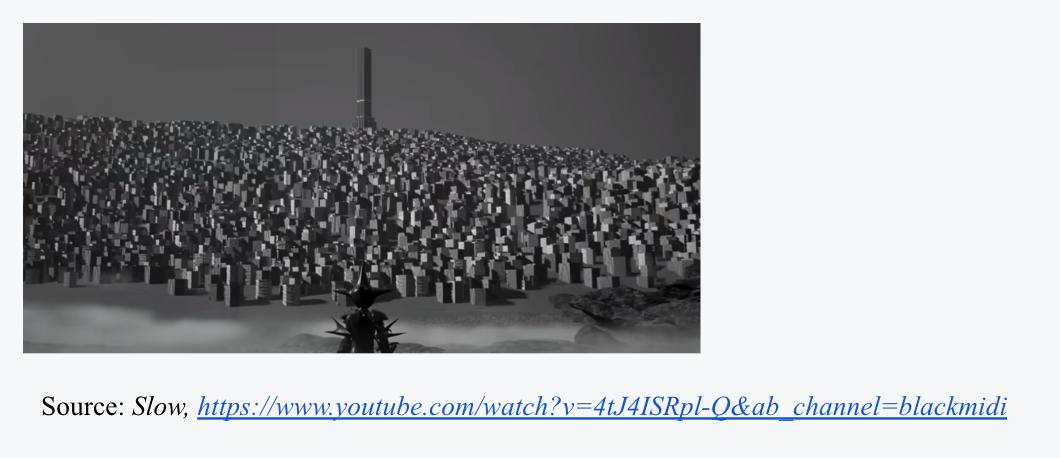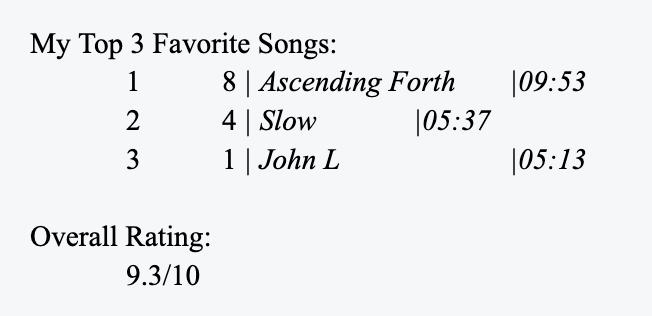
5 minute read
A REVIEW OF BLACK
from APRIL 2023
MIDI'S 'CAVALCADE (2021)'
Shinju Kim
Advertisement
Black Midi is a relatively new band coming from London, forming in 2017 as a trio consisting of Geordie Greep (who plays vocals, guitar, piano, synths, accordion), Cameron Picton (who plays vocals, bass, synths, flute, guitar), and Morgan Simpson (who plays drums) The group began by playing at shows and releasing their first few singles in 2018, eventually culminating in their ground-breaking debut album, Shlagenheim (2019), nine tracks of noisy, experimental and challenging rock music that creates unceasing, thrilling suspense in its refusal to obey traditional song structures. Instead, Schlagenheim opted for strange, abrasive melodies, sudden sharp spurts of instrumental chaos and abstract lyrical content, the unfettered creativity of which caused the album to be nominated for the mercury prize, one of the most prestigious annual music awards in the UK

However, instead of staying within the realm of sharp, abrasive and erratic experimental noise rock as had been established by their first project, their sophomore album introduced a complete sonic shift that would come to cement their primary refined sound in their following releases. Cavalcade (2021), subtracts the band’s initial metallic din for a genre of progressive rock that dates back to the 60s and 70s, emphasizing conceptual lyrical content, experimentation and ambitious compositions, which allowed the band to more smoothly incorporate elements and textures of soft jazz and jazz rock. This new sound would be refined and intensified following the band’s adrenaline-pumping release Hellfire (2022), but personally, it is in Cavalcade that the band’s ideas are at their most chaotic, scattered, freakishly weird and enchantingly beautiful.
The album cover alone (shown on the left) is discordant, crowded, psychedelic and overwhelming at first glance, a particularly fitting description of not just the music across the whole album, but in particular the album’s first song, John L. At just over 5 minutes, the album plunges the unprepared listener into the cacophony of the music’s world, riddled with blunt, compounding percussion, cacophonous nonmelodies, high-pitched violin strings and faint strangled saxophones that resemble the ugly screech of fingernails against chalkboards, the occasional slamming of a grand piano amongst perhaps a hundred other sounds intertwined within John L’s disorderly instrumental. These different sounds will often start and stop altogether at random intervals leaving very brief, suspenseful silences almost as if to let the listener’s head up out of the water to momentarily breathe before plunging them back into the stormy water as the strange vocals of Geordie Greep echo around the audio as if recorded in a secluded cavern. One of the most amazing segments of the album’s entire composition occurs around the song’s 3 minute mark when much of the instrumentation begins to play in a tense staccato built around a disorienting polyrhythm. The lyrics, meanwhile, depict a tale about a deranged cult leader, named John L (pronounced John Fifty), his failure to satisfy his restless and bloodthirsty followers, and his falling victim to his own cult’s brutality.

In contrast, the second song, Marlene Dietrich, is a far more pleasant sounding song, with groovy bass and smooth, beautiful instrumentation. As opposed to frantic, Greepe approaches this track vocally with a bellowing, passionate and tuneful performance while painting a picture of a scene involving the German-born American actress Marie Magdalene Dietrich performing for a crowd of soldiers during the war. Yet, a sinister tone hangs over the tale, as the song slowly reveals that despite the seemingly uplifting effect the performer has on the soldiers, she may have been concealing some sort of murderous plot unknown to the audience Interpretations of the song do vary, with some interpreting the knife not as part of a plot, but a metaphor for the actress’s sorrow and pain in her performance and its reception by the crowd.
The brevity of Marlene Dietrich, at a little less than 3 minutes in run time, quickly paves way for an energetic return to the instrumental chaos akin to the first track on song three of Cavalcade, Chondromalacia Patella, a song strangely named after a medical condition that leads to chronic knee pain. The song feels fast in tempo and restless, reminiscent of the uncontrollable desire to move that arises out of being rendered immobile The song becomes more and more intense, more and more restless as the song progresses in crescendo, resulting in a mind-boggling instrumental climax which transitions seamlessly into track 4, Slow, a deeply existential piece that captures a feeling of prolonged dread The vocals, this time delivered by Cameron Picton, shrink into a haunting whisper as the song builds a formidable sense of unresolved strain as the vocals narrate the thoughts of a person impatiently waiting for life to end watching as their existence comes to a gratingly gradual deterioration. There is something chillingly nihilistic about the concept that the song generates through both its meticulous composition and poetically written lyricism. Track 5, Diamond Stuff, slightly slower in tempo, creates a contemplative and mysteriously reflective atmosphere that over the course of its 6 minute runtime expands and blossoms with the euphoriainducing harmonies of a faint ethereal choir that gradually comes into audible focus. It serves as one of the most awe-inspiring, transcendent and beautiful songs across the entire album in how the song’s minimalist texture develops and reaches its instrumental culmination Another seamless transition leads the listener into Dethroned, a 5 minute track that lyrically begins to discuss ideas surrounding a character who has been literally dethroned in either a literal or more figurative sense, and struggles in his thoughts as he tries to come to terms with his situation but continues to delude himself with denial and refusal to see the situation as is.
Track 7, Hogwash and Balderdash is perhaps the most volatile and dissonant of the songs musically on the album which makes sense as the song’s title is a direct reference to “nonsense”. The lyrics are just as absurd, describing 2 runaway convicts characterized as chickens named Hogwash and Balderdash that are hiding from the law The characters begin to grapple with ideas of defeat and giving up as the law appears to them to be unavoidable at every turn, leading to a sudden and abrupt spike in sonic intensity before abruptly leading to the album’s final and eighth song, Ascending Forth, just short of 10 minutes in full length. Yet for all of the abrupt changes and sudden shifts that Black Midi laces throughout their musical work, Ascending Forth forgoes violent experimentation for a calmer, meditative whilst still grand and gratifying ballad about a writer named Mark trapped in his own writer’s block while trying to compose new music The jazzy saxophone passages on the track are gorgeous, and both Greepe’s singing and the string-based instrumentation on this last song feel like a slightly somber and bittersweet emotional farewell as Mark is taken away for his attempts to break the norms expected of him and his art. The song eventually builds up to a gushing, breath-takingly powerful climax, not overwhelming for its abrasiveness and sharp edges as may have been the case on Black Midi’s previous work, but instead overwhelming in its gentleness and almost tear-wrenching glamor and beauty


As Black Midi continues to create and release modern ground-breaking and norm-subverting styles of experimental rock, it may very well become the case that Cavalcade will become overlooked in comparison to the more bombastic and hard-hitting albums released adjacently in their discography. And while Cavalcade is certainly not an album without its technical flaws, such as the slightly questionable mixing on some of the album’s later tracks, I found that underneath Black Midi’s usual instrumental creative madness and volatility, as well as the album’s cryptic vocabulary and symbolic/metaphorical lyrical contents, lies a heartfelt and introspective album about their band’s self-perception in a modern music industry, as well as consistent themes of anxiety surrounding death and downfall throughout these songs that perhaps shed light on some of Black Midi’s most human and relatable themes expressed to date Cavalcade may just barely not be my number one favorite Black Midi album, but it is perhaps their project that I emotionally resonate with most allowing me as a fan and listener to peer into the window of not just their creative thoughts, but also those thoughts perhaps slightly more vulnerable and come from a more personal and existential space. I applaud this album and the rest of their expanding catalog, and wish the band the very best in their future against-the-grain musical endeavors.
Source(s): https://en wikipedia org/wiki/Black Midi https://en.wikipedia.org/wiki/Cavalcade (Black Midi album) https://genius.com/albums/Black-midi/Cavalcade






